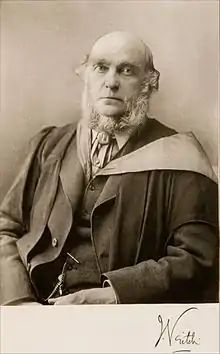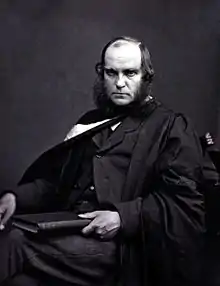John Veitch (poet)
Prof John Veitch (October 24, 1829 – September 3, 1894), Scottish philosopher, poet and historian. He was born in Peebles, the only son of Peninsular War veteran James Veitch and his wife Nancy Ritchie, a woman steeped in the folk traditions of the Borders. He was educated at the University of Edinburgh.[1]


He was assistant lecturer successively to Sir William Hamilton and Alexander Campbell Fraser (1856–60). In 1860 he was appointed to the chair of logic, metaphysics and rhetoric at the University of St Andrews, and in 1864 to the corresponding chair at the University of Glasgow.[1]
In St. Andrews, he lived at 8 Playfair Terrace.[2]
In Glasgow, he lectured to working men and women and between 1877 and 1883 put on courses for the Glasgow Association for the Higher Education of Women. He founded the Scottish Mountaineering Club in 1892. He deplored the damaging environmental impacts of industrialisation and campaigned to save old buildings.[3]
In philosophy an intuitionist, he was dismissive of idealist arguments. He is remembered chiefly for his work on the literature and antiquities of the Scottish Borders. See Memoir by his niece, Mary RL Bryce (1896).[1]
Publications
- translations of Descartes' Discours de la méthode (1850) and Méditationes (1852)
- an edition of Sir William Hamilton's lectures with memoir (1869, in collaboration with HL Mansel)
- Tweed, and other Poems (1875)
- Lucretius and the Atomic Theory (1875)
- The History and Poetry of the Scottish Border (1877; ed. 1893)
- Hamilton (1882)
- The River Tweed from its Source to the Sea (1884)
- Institutes of Logic (1885)
- The Feeling for Nature in Scottish Poetry (1887)
- Knowing and Being (1889)
- Merlin (1889)
- Dualism and Monism (1895)
- Border Essays (1896).
References
- John Veitch. University of Glasgow
- "Archived copy" (PDF). Archived from the original (PDF) on 2017-11-11. Retrieved 2017-11-11.CS1 maint: archived copy as title (link)
- Cowley, Stephen (1994) John Veitch, Scottish Philosopher, Poet and Literary Critic, in Edinburgh Review Issue 92, Edinburgh, pp. 141 - 147
External links
 Works written by or about John Veitch at Wikisource
Works written by or about John Veitch at Wikisource- Works by John Veitch at Project Gutenberg
- Works by or about John Veitch at Internet Archive
- Works by John Veitch at LibriVox (public domain audiobooks)
